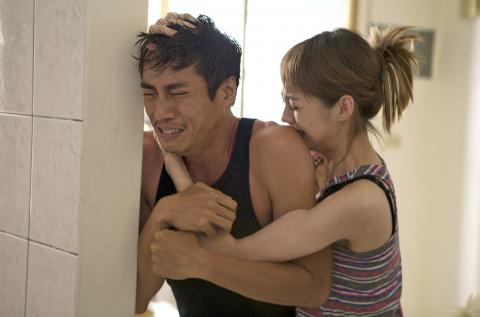Maverick (菜鳥) is the second part of acclaimed director Cheng Wen-tang’s (鄭文堂) trilogy that addresses transitional justice. The issue of abuse of power takes center stage again, finely delivered and continuing from Tears (眼淚), the first installment that offered a sober, rueful portrait of a veteran police officer haunted by his past. This time around, the police drama is made with a nod to audience-friendly storytelling and a more optimistic ending.
The film opens with Yeh (You Sheng, 宥勝) assigned to raid a gambling den run by the mob on his first day of work at a police station in Taichung. What Yeh and his colleagues encounter, however, are more than just a few gamblers and mobsters. Inside a suite at the illegal casino, Monkey (Huang Teng-hui, 黃鐙輝), the son of the Taichung city council speaker, played by Yang Lie (楊烈), is found too doped up to notice what is happening, lying beside an equally intoxicated senior police officer.
The next day, the speaker’s lackeys pay a visit to the police station, demanding Yeh stay away from the gambling operation. Disillusioned, Yeh soon realizes that the politician controls the police and criminal gangs. The rookie is also disappointed to learn that Brother Ming (Kaiser Chuang, 莊凱勛), a role model he looked up to when studying at the police academy, has gone along with others after years of working in the corrupt environment.

Photo courtesy of Dreamosa Film
However, Yeh begins to investigate Monkey’s illicit business, and finds out that the speaker’s crooked son is behind drug trafficking in local high schools and responsible for battering a student into a coma. As Yeh probes deeper, it becomes clear that the speaker will protect his son and his own interests at any cost.
In a parallel plotline, Brother Ming does everything he can to help his girlfriend Ann (Jian Man-shu, 簡嫚書), who works at a hostess club in order to pay off the massive debt her younger brother owes to the loan sharks.
Money, power and politics form the new trinity in Cheng’s work, in which the sense of right and wrong is blurred. While Tears focuses more on the past, in which state violence is manifested through Tsai Chen-nan’s (蔡振南) character, who used to torture his victims and lives in a vicious circle of never-ending remorse, Maverick deals with the present, bringing new hopes and optimism through the character of the young police officer who is free to make a moral choice not to collude with the corrupt system.

Photo courtesy of Dreamosa Film
The film also marks Cheng’s rare experiment with genre, spiced up with romance, crimes and drug abuse. Even though the director’s attempt at mainstream filmmaking is sometimes uneven and messy, a sense of guarded realism is always present, keeping the story and its characters rooted in life.
The film owes much of its success to its cast, including Yang and Yu An-shu (游安順), both of whom emanate grounded presence. You Sheng, one of the film’s leads, commands enough innocence and candor needed for his role as the untainted rookie cop. Yet Chuang, a professionally-trained stage actor, steals the movie with a role that is a mixture of anguish and passion. His romantic scenes with Jian are among the most intense and heartfelt seen in Taiwanese productions in recent years.
Fortunately, the actors’ admirable rendering doesn’t pass unnoticed. For her deeply felt performance as a damaged yet strong young woman in Maverick, Jian is nominated for best supporting actress at this year’s Golden Horse Awards (金馬獎), set to take place next Saturday.
Film notes
Maverick (菜鳥)
Directed by: Cheng Wen-tang (鄭文堂)
Starring: You Sheng (宥勝) as Yeh, Kaiser Chuang (莊凱勛) as Brother Ming, Jian Man-shu (簡嫚書) as Ann, Gin Oy (歐陽靖) as Hui Min
Language: in Mandarin and Hoklo with Chinese and English subtitles
Running time: 118 minutes
Taiwan release: Today

In the March 9 edition of the Taipei Times a piece by Ninon Godefroy ran with the headine “The quiet, gentle rhythm of Taiwan.” It started with the line “Taiwan is a small, humble place. There is no Eiffel Tower, no pyramids — no singular attraction that draws the world’s attention.” I laughed out loud at that. This was out of no disrespect for the author or the piece, which made some interesting analogies and good points about how both Din Tai Fung’s and Taiwan Semiconductor Manufacturing Co’s (TSMC, 台積電) meticulous attention to detail and quality are not quite up to

April 21 to April 27 Hsieh Er’s (謝娥) political fortunes were rising fast after she got out of jail and joined the Chinese Nationalist Party (KMT) in December 1945. Not only did she hold key positions in various committees, she was elected the only woman on the Taipei City Council and headed to Nanjing in 1946 as the sole Taiwanese female representative to the National Constituent Assembly. With the support of first lady Soong May-ling (宋美齡), she started the Taipei Women’s Association and Taiwan Provincial Women’s Association, where she

Chinese Nationalist Party (KMT) Chairman Eric Chu (朱立倫) hatched a bold plan to charge forward and seize the initiative when he held a protest in front of the Taipei City Prosecutors’ Office. Though risky, because illegal, its success would help tackle at least six problems facing both himself and the KMT. What he did not see coming was Taipei Mayor Chiang Wan-an (將萬安) tripping him up out of the gate. In spite of Chu being the most consequential and successful KMT chairman since the early 2010s — arguably saving the party from financial ruin and restoring its electoral viability —

It is one of the more remarkable facts of Taiwan history that it was never occupied or claimed by any of the numerous kingdoms of southern China — Han or otherwise — that lay just across the water from it. None of their brilliant ministers ever discovered that Taiwan was a “core interest” of the state whose annexation was “inevitable.” As Paul Kua notes in an excellent monograph laying out how the Portuguese gave Taiwan the name “Formosa,” the first Europeans to express an interest in occupying Taiwan were the Spanish. Tonio Andrade in his seminal work, How Taiwan Became Chinese,